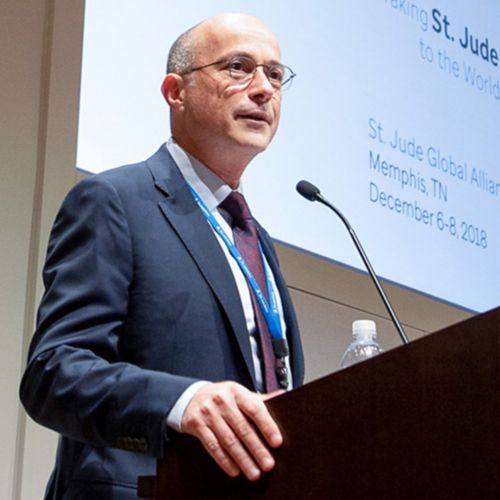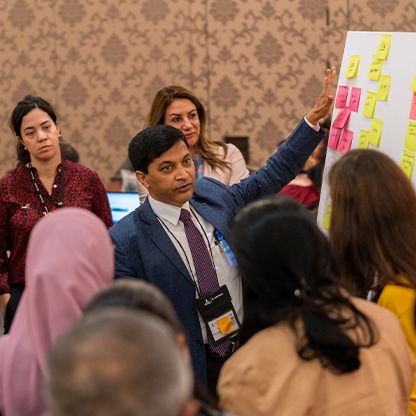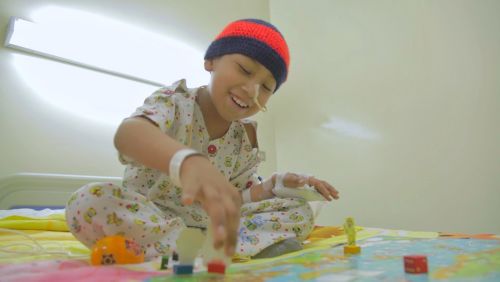St. Jude Family of Websites
Explore our cutting edge research, world-class patient care, career opportunities and more.
St. Jude Children's Research Hospital Home

- Fundraising
St. Jude Family of Websites
Explore our cutting edge research, world-class patient care, career opportunities and more.
St. Jude Children's Research Hospital Home

- Fundraising
Hematology
Other Transversal Programs:
The Global Hematology Program seeks to advance and innovate the field of sickle cell disease, and other non-malignant childhood catastrophic blood disorders, through community building, tool design and implementation research, ultimately improving survival and outcomes worldwide.
The program’s vision is that of a world where every young person with sickle cell disease and other non-malignant catastrophic blood disorders receives specialized, compassionate care leading to a long and fulfilling life.
Sickle Cell Disease
Under-5 mortality among children with sickle cell disease remains alarmingly high, thus, sickle cell disease represents a growing public health crisis. However, the solutions are neither complex nor prohibitively expensive. What is needed is global coordination and sustained political will toward a unifying target. By investing in the widespread implementation of a low-cost, evidence-based essential care package, we can transform the health outcomes for the more than 500,000 children born with sickle cell disease each year, advancing equity and improving global child survival.
As scientific advances in sickle cell disease care and cure continue to accelerate, the opportunity to create a global initiative to design and implement scalable, sustainable, decentralized and integrated population-level approaches has never been more urgent or promising.
The St. Jude Global Hematology Program joins the chorus calling for the community to speak with one voice. How we use our collective voice, and what message we communicate, matters more than ever. The time for action is now. The world needs a global initiative for sickle cell disease, because every delay costs lives, lives we already have the tools to save.
Sickle Cell Outcome Grading System (SCOGS)
Currently in pilot phase, SCOGS is a new method for classifying disease severity for sickle cell disease (SCD), collaboratively developed in the US by adapting the model of Common Terminology Criteria for Adverse Events (CTCAE) to cover all major SCD complications. This SCD assessment tool includes definitions, diagnostic criteria, severity gradings, and frequency classifications for 53 health outcome events. A future phase of SCOGS will expand to adapt its use in global contexts, after testing is completed in the US.
Collaboration
ALUA – Lusophone Alliance of Specialists for Sickle Cell Disease
Lusophone Alliance of Specialists for Sickle Cell Disease (ALUA) is an organization that aims to promote technical and scientific knowledge to improve the diagnosis and treatment of people with sickle cell disease in the Community of Portuguese-speaking Countries (CPLP). ALUA’s mission is to increase the survival and quality of life of people with sickle cell disease, promoting strategic initiatives in diagnosis, treatment, epidemiology and training of health care providers.
The overall objective of ALUA is to promote collaboration between Portuguese-speaking countries for sickle cell disease care, involving governments, the CPLP and other health organizations at the local, regional and global levels. Cooperation health within the CPLP is one of the areas with the greatest potential for development and can contribute to responding to the enormous challenges faced by people living with sickle cell disease.
Scroll down to the bottom of the page to join the St. Jude Global Alliance Online Community and gain access to the ALUA Online Community group.
Our Team
-
View Details
Jane S. Hankins, MD, MS
Member, St. Jude Faculty
Director, St. Jude Global Hematology Program
Jane S. Hankins, MD, MS
Member, St. Jude Faculty
Director, St. Jude Global Hematology Program
Affiliations
Clinical Interests
- New therapeutic approaches in sickle cell disease
- Transition to adult care
- Disease progression
Contact Information
Jane S. Hankins, MD, MS
Global Pediatric Medicine
MS 721, Room 4027
St. Jude Children's Research Hospital
262 Danny Thomas Place
Memphis, TN 38105-3678
-
View Details
Nick Faris
Program Manager, Global Hematology Program
Affiliations
Short Biography
Nick Faris is a program manager for the Global Hematology team at St. Jude Children’s Research Hospital in the Department of Global Pediatric Medicine.
Before joining St. Jude, Nick was a member of the Baptist Cancer Center’s Thoracic Oncology team in Memphis, serving most recently as the department director. In that role, he coordinated system-level efforts to design, implement and improve clinical programs that bridged the full care continuum from tobacco cessation to survivorship, with a mission to eliminate lung cancer stigma and mortality for all people. He also served as a member of several national and international patient advocacy committees.
Nick’s specific interest is in leveraging team science, implementation science and epidemiology to support large-scale public health interventions.
Contact Information
Nick Faris
Global Pediatric Medicine
St. Jude Children's Research Hospital
262 Danny Thomas Place
Memphis, TN 38105-3678
-
View Details
Tessa Youngner, MS
Program Coordinator, Hematology
Affiliations
Short Biography
The majority of Tessa’s professional experience has focused on improving care delivery and outcomes for individuals living with sickle cell disease, primarily through the establishment of innovative public-private partnerships. In 2018, she interned at the National Heart, Lung, and Blood Institute to support the launch of its Cure Sickle Cell initiative, as well as the coordination of its Women’s Health Maternal Morbidity & Mortality Working Group. Most recently, Tessa served the American Society of Hematology as manager of the SCD Coalition, where she led the strategic planning and daily operations of a diverse alliance representing more than 100 organizations dedicated to combating challenges for individuals with sickle cell disease. Tessa is thrilled to continue supporting the sickle cell disease community in this new role and contribute to St. Jude Global’s mission.
She holds a bachelor’s degree in government from William & Mary and a master’s degree in bioethics from Harvard Medical School.
Tessa is a proud native of the greater Washington D.C.-Maryland/Virginia area. Outside of work, she enjoys listening to live music, practicing yoga, and spending time outside with her cat, Rutherford.
Contact Information
Tessa Youngner, MS
Global Pediatric Medicine
St. Jude Children's Research Hospital
262 Danny Thomas Place
Memphis, TN 38105-3678
-
View Details
Ombeni Idassi, MHS
Program Specialist, Global Hematology Transversal Program
Affiliations
Short Biography
Ombeni Idassi is a program specialist for the Global Hematology Transversal Program within St. Jude Global. Originally from Nashville, Ombeni obtained his Bachelor of Science in biology from North Carolina A&T State University.
Throughout the past 12 years, Ombeni has translated his passion for research into a deep-seated commitment to pediatric medicine and sickle cell disease. Following a three-year tenure at City of Hope Medical Center in a translational breast cancer lab, Ombeni pursued a master’s degree in health sciences at Meharry Medical College.
With three years of medical training under his belt, Ombeni harbors aspirations of effecting meaningful change in the lives of children and families grappling with hematological diseases. He seeks to enact a positive and substantial influence through implementation science, fostering collaboration, mentorship of the next generation of healthcare professionals and serving as a beacon of hope.
Contact Information
Ombeni Idassi, MHS
Global Pediatric Medicine
St. Jude Children's Research Hospital
262 Danny Thomas Place
Memphis, TN 38105-3678
-
View Details
La'Ron (Lari) Browne, MD
Physician Science Instructor
Affiliations
Short Biography
La’Ron Browne is a Physician Science Instructor in the Global Hematology Program. Her focus is primarily on research projects aimed at strengthening health systems for non-malignant hematologic conditions in low-resource settings. Her work will complement ongoing initiatives led by the Global Hematology Program, particularly in advancing evidence-based strategies for the care and health service delivery for catastrophic pediatric blood disorders.
Contact Information
La'Ron (Lari) Browne, MD
St. Jude Children's Research Hospital
262 Danny Thomas Place
Memphis, TN 38105-3678
-
View Details
Kelly Pimenta, PhD
Postdoctoral Research Associate
Affiliations
Short Biography
Kelly Pimenta is an epidemiologist who recently earned her PhD in Epidemiology and Biostatistics from the University of Memphis. Her doctoral research focused on healthcare transitions among adolescents with sickle cell disease, reflecting her broader commitment to addressing health disparities among underserved populations. She also holds a Master of Public Health from Rutgers University and a Bachelor of Science in Public Health from The College of New Jersey.
Kelly’s career has centered on applying rigorous epidemiologic and implementation science methods to improve health outcomes in both domestic and global settings. She has conducted research in collaboration with institutions in Brazil, focusing on transition readiness, quality of care, and systems strengthening for chronic disease management. Her work integrates qualitative and quantitative approaches and emphasizes cross-cultural adaptation and equity-driven strategies.
Kelly was drawn to St. Jude Children’s Research Hospital by its mission to advance care for children with catastrophic illnesses and its commitment to global health equity. She is motivated by a desire to generate actionable evidence that can transform healthcare delivery for vulnerable populations—especially adolescents navigating the shift from pediatric to adult care. At St. Jude, she aims to contribute to impactful, patient-centered research that informs sustainable interventions across diverse healthcare systems.














